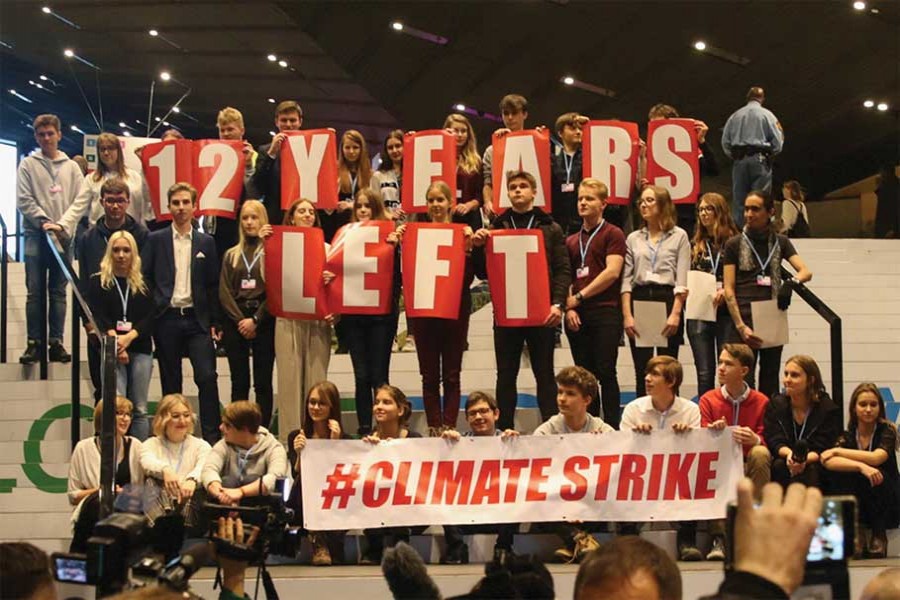Divisions among the governments in favour of real actions to address the issue of global climate change have been putting obstructions to work out effective action plans to reduce Green House Gas (GHG) emissions. This division has surfaced at the 24th Conference of Parties (COP24) under the United Nations Framework Convention on Climate Change (UNFCCC) which began in Katowice, the century-old coal miner's town in Poland, on December 02.
The Guardian reports (December 11, 2018) that the Intergovernmental Panel on Climate Change (IPCC) report produced by scientists following the Paris Climate Summit in 2015 invited fierce debate in the COP24 on the findings on global temperature rise between 1.5 and 2.0 celsius. Most of the country representatives remained in favour to 'welcome' the report and to restrict fossil fuel use and promote greater role of renewable energy. But the four major oil producing and exporting nations - the USA, Russia, Saudi Arabia and Kuwait - insisted that the study should merely be "noted".
The Donald Trump administration had earlier decided that it no longer wanted to be part of the Paris Climate Agreement (which was signed by 193 countries in 2015). Many observers consider that the Trump administration not only wants to withdraw from the Paris climate deal but to prevent any progress on the deal. Vanuatu's Foreign Minister, Ralph Regenvanu, while speaking at the COP24 stated that the United States and other high carbondioxide-emitting developed countries had deliberately tried to frustrate the UN climate summit in Katowice, Poland. The US administration preferred so far not to comment on such remarks. On the other hand, Australian government's position is that 'fossil fuels can be used as efficiently and cleanly as the use of emission free nuclear energy'. Practically, Australia and the host Poland have reaffirmed their commitment to coal and supported US position.
Antonio Guterres, the UN Secretary General, strongly criticised the position of the four major oil producing countries that have been refusing to "welcome" the IPCC special report on 1.5°C global warming, and termed the rejection as indefensible. In his statement Mr. Guterres said, "We're running out of time…To waste this opportunity would compromise our last best chance to stop runaway climate change. It would not only be immoral, it would be suicidal." He further added, "The IPCC special report is a stark acknowledgment of what the consequences of global warming beyond 1.5 degrees will mean for billions of people around the world, especially those who call small island states home. This is not good news, but we cannot afford to ignore it."
The COP24 has been trying to establish a "rule book" (a detailed annotation of the Paris agreement) on how to implement the commitments made in the Paris climate agreement in 2015. However, absence of political consensus has pushed the 'rule book' into protracted debate on the text of the IPCC report on the impacts of a temperature rise of 1.5°C at the COP 24. Unless drastic measures are taken to reduce carbon dioxide and other Green House Gas (GHS) emissions by the world community, scientists consider that hundreds of thousands of people living in the low lying islands and in the coastal areas will be forced to leave their homes and loose livelihoods within next few decades due to global warming and sea level rises.
A study by researchers at the US Geological Survey (USGS), the Delters Institute in the Netherlands and Hawaii University, found that many small islands in the Pacific and Indian Oceans would be uninhabitable for humans by the middle of this century due to rapid sea level rise.
Drastic GHG emission reductions may help to cope with the race to reverse the rapid rate of global warming by 2030 through de-carbonisation of electricity production and improving energy efficiency in different sectors such as transportation and manufacturing industries. It further requires technological innovations and unprecedented adjustments in society's behaviour and lifestyle. Unfortunately, the major contributors of GHG emissions in the atmosphere prefer little meaningful action but want to continue the debate on the impacts of climate changes.
Mushfiqur Rahman, a mining engineer, writes on energy and environment issues. [email protected]


